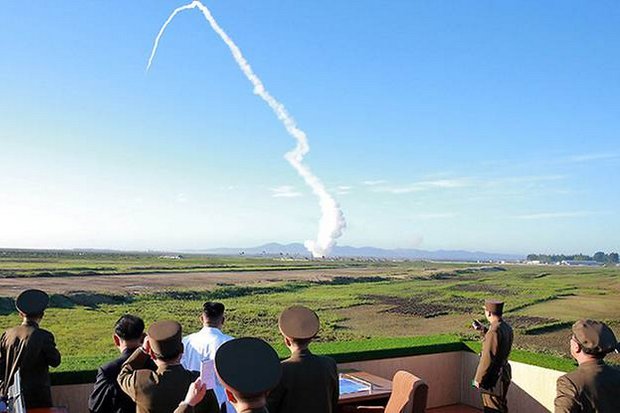
SEOUL - North Korea fired at least one short-range ballistic missile on Monday that landed in the sea off its east coast, the latest in a fast-paced series of missile tests defying world pressure and threats of more sanctions.
The missile was believed to be a Scud-class ballistic missile and flew about 450km, South Korean officials said. North Korea has a large stockpile of the short-range missiles, originally developed by the Soviet Union.
China quickly criticised the North Korean missile launch, saying Beijing opposes its activities in violation of U.N. Security Council resolutions.
The Chinese Foreign Ministry also said in a statement that the current situation on the Korean Peninsula is complicated and sensitive, and that China hopes relevant countries maintain calmness and restraint.
US President Donald Trump portrayed the missile test as an affront to China in a morning post on Twitter. "North Korea has shown great disrespect for their neighbor, China, by shooting off yet another ballistic missile...but China is trying hard!" he wrote.
Japan's Asahi newspaper disclosed the US Navy has decided to deploy the USS Nimitz as a third carrier-led strike force to the western Pacific to increase pressure on North Korea to rein in its arms programs.
Nimitz, one of the world's largest warships, will join the USS Carl Vinson and USS Ronald Reagan there, according to Asahi.
It is rare for the US Navy to deploy three of its total of 11 aircraft carriers to the same region at the same time.
Monday's launch followed two successful tests of medium-to-long-range missiles in as many weeks by the North, which has been conducting such tests at an unprecedented pace in an effort to develop an intercontinental ballistic missile (ICBM) capable of hitting the mainland United States.
North Korea was likely showing its determination to push ahead in the face of international pressure to rein in its missile program and "to pressure the (South Korean) government to change its policy on the North," South Korea's Joint Chiefs of Staff spokesman Roh Jae-cheon said.
It was the third ballistic missile test launch since South Korea's liberal President Moon Jae-in took office on May 10 pledging to engage with the reclusive neighbour in dialogue.
Moon says sanctions alone have failed to resolve the growing threat from the North's advancing nuclear and missile program.
The missile reached an altitude of 120km, Roh said.
"The assessment is there was at least one missile but we are analysing the number of missiles," he said.
North Korea, which has conducted dozens of missile tests and tested two nuclear bombs since the beginning of 2016 in defiance of U.N. Security Council resolutions, says the program is necessary to counter US aggression.
The White House said Trump had been briefed about the launch. The US Pacific Command said it tracked what appeared to be a short-range ballistic missile for six minutes and assessed it did not pose a threat to North America.
The United States has said it was looking at discussing with China a new U.N. Security Council resolution and that Beijing, North Korea's main diplomatic ally and neighbour, realises time was limited to rein in its weapons program through negotiations.
US Defence Secretary Jim Mattis, asked what a military conflict with North Korea might look like if diplomacy failed, warned on Sunday it would be "probably the worst kind of fighting in most people's lifetimes".
"The North Korean regime has hundreds of artillery cannons and rocket launchers within range of one of the most densely populated cities on Earth, which is the capital of South Korea," Mattis told CBS news program "Face the Nation".
"And in the event of war, they would bring danger to China and to Russia as well," he said.